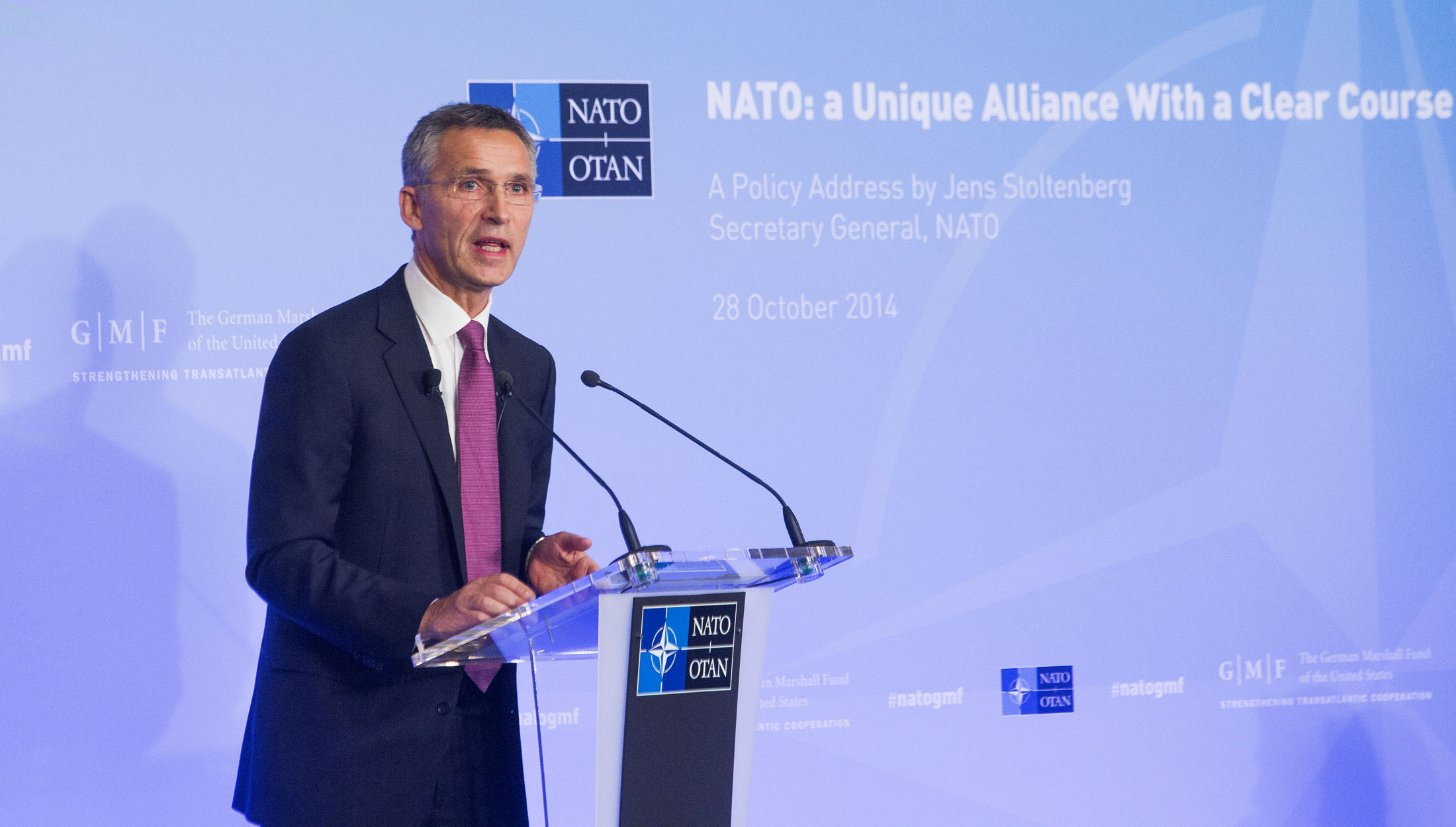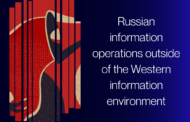Nový generálny tajomník NATO Jens Stoltenberg predniesol 28. 10. 2014 v Bruseli svoj prvý verejný prejav. V prejave sa zameral najmä na priority Aliancie do summitu NATO vo Varšave v roku 2016. Prvou prioritou je udržanie silnej Aliancie po politickej aj vojenskej stránke. Druhou prioritou je spolupráca s partnermi pre posilnenie stability. Partnerstvo a rozšírenie sú významné úspechy NATO. Treťou prioritou je rozvoj transatlantického spojenectva.
NATO: a unique Alliance with a clear course
NATO Secretary General Jens Stoltenberg
28 October 2014
Ladies and Gentlemen,
Thank you very much for that warm welcome. And thank you Karen for those kind words. And for coming over to host me in person. Karen – like me – you just started a new and challenging job. I wish you all the best in your new position. I look forward to working with you on many future occasions. I am really glad that my first public speech as Secretary General of NATO is hosted by the German Marshall Fund of the United States – another truly transatlantic organisation.
I know that I come into this job at a critical time. When we see national borders and international rules challenged by force. And turmoil in our neighbourhood. To the east, Russia’s actions in Ukraine are in breach of international law. They have severely damaged trust. And they pose a major challenge to Euro-Atlantic security. To the south, borders are disappearing. States are fragile. ISIL, and other extremist groups across North Africa and the Middle East, are spreading violence and instability. And they risk exporting terrorism to our streets. These threats come on top of others. Missile proliferation, energy disruption, and cyber attacks. Not long ago, we used to refer to these threats as emerging. But they have well and truly emerged. And they are now part and parcel of our security environment. We can, and we must, rise to the challenge.
I grew up in a world that felt at the time as dangerous as the world we live in today. As a child in Norway during the Cold War, I didn’t know much about Article 5 or the Washington Treaty. But I did know that NATO was there to protect us. I felt safe, because of NATO. Later as a young conscript in the Norwegian Army, we were trained to hold out. In the secure knowledge that our Allies would quickly come to our rescue. We knew that Norway could not make it alone. But we also knew that we were not alone. Through NATO, we enjoyed a level of protection that only a transatlantic Alliance of democracies could provide. Today, I see it as my duty to ensure that current and future generations feel as safe and secure as I did back then. Security is the foundation for our freedom and our open societies; for our prosperity; and for our ability to address other great challenges of our time – such as poverty and climate change. If we lose our security, we lose so much more. The nature of the challenges to our security may change. But the answer remains the same: working together in a strong NATO. This is a winning combination. Over the past 65 years, it has helped us to weather many storms. It will get us through these current turbulent times. And those we will face in the future.
Our NATO Summit in Wales last month set out a clear course. That makes my job both easy – and hard. Easy, because we know what to do. And hard, because we still have much to do. And time is short. At the Wales Summit we took key decisions. I am determined to translate those decisions into lasting results ahead of our next Summit in Warsaw in 2016. I have set out three priorities.
First, we must keep NATO strong. Strong as a political Alliance. And strong as a military Alliance. This starts with solidarity and resolve. We are an Alliance of democracies. We may not always agree at first. But by debating, consulting and working together, we arrive at firm decisions. And together, we act on those decisions. This is the strength of our Alliance. To stay strong we must preserve and strengthen collective defence. The pledge to defend each other – Article 5 of our founding treaty – remains the bedrock of NATO. It is the basis for everything we do.This is why the implementation of the Readiness Action Plan we agreed at the Wales Summit is key. This is the biggest reinforcement of our collective defence since the end of the Cold War. We are making our forces more agile. And able to deploy quickly whenever threats emerge. From any direction. We are also maintaining a continuous NATO presence in the Eastern part of our Alliance, on a rotational basis. To reassure our Allies. And to deter anyone who might wish to challenge us. In recent months, the number of NATO jets in the skies over our Eastern Allies has increased five times.We have deployed more ships in the Baltic and the Black Sea. And this year, we are conducting over 200 NATO and national exercises in Europe. A new exercise kicks off every two days. These assurance measures are just the start. We are also setting up a rapid reaction “Spearhead Force”. I expect Defence Ministers to approve the size and design of the force when we meet in February. We are also putting in place elements of a robust command and control structure on the territory of our Eastern Allies. And pre-positioning equipment and supplies. So that we can reinforce rapidly, if we need to. During my first weeks in office I have visited both Poland and Turkey. In different ways these Allies exemplify the challenges we face, both to the East and to the South. In Poland, I visited the Łask airbase. And I met with pilots and air crews from across the Alliance. From the United States and Canada, to Poland and Portugal. Working together as one. In Turkey, I saw the Patriot batteries at Gaziantep. And I met troops from the United States, Germany, and many other Allies. Helping to strengthen Turkey’s defence against missile attacks. This is what collective defence is all about. Twenty-eight for twenty-eight. And this is why we must implement the Readiness Action plan on time and in full. Of course this will be a challenge. But NATO is used to meeting challenges. And this is the plan we need – to deal with threats from wherever they may come. Whether they are conventional or unconventional. Or hybrid threats, as we have seen in Ukraine.
This leads me to my second priority. To work with our partners to bring more stability to our neighbourhood. Partnerships are one of NATO’s greatest success stories. Enlargement is another. Our partners have worked with us to increase the space of democracy and freedom in Europe. Twelve of them have actually become Allies. And all partners have made important contributions to our operations. They have helped to enhance international security and to defend the values on which our Alliance is based. But today, Russia is trying to roll back the progress we have made in this collective effort. And some of our partners are facing great pressures. We will continue to support Ukraine and our other partners in our eastern neighbourhood. And we will continue to uphold the principle that each country has the right to choose its own path. This is fundamental. And we all subscribed to it. Including Russia. I congratulate the people of Ukraine for exercising their right to vote in the parliamentary elections on Sunday. Despite difficult conditions, these elections were in line with international standards. The large majority of the people of Ukraine have clearly and democratically spoken in favour of an ambitious reform agenda and a European path. I strongly regret, however, that many Ukrainians were unable to exercise their democratic right to vote. In Crimea, which Russia illegally and illegitimately annexed. And in parts of Eastern Ukraine, where violence and intimidation by Russian-backed separatists continues. NATO fully supports Ukraine’s sovereignty, independence and territorial integrity within its internationally recognised borders. We call on Russia to end its destabilising actions in Ukraine, and pull back its forces.
I am the first NATO Secretary General from a country that has a common border with Russia. I remember visiting that border when it was completely closed. Back in the days of the Soviet Union. When looking across was like staring into something dark and scary. Now there is a visa-free zone in its place. And hundreds of thousands of people cross the border every year. To the benefit of both our countries . The freedoms and prosperity that many Russians have enjoyed in recent years have come from open borders like this. And from integration into the global rules-based order. Russia is not just Norway’s neighbour. It is NATO’s biggest neighbour. And both NATO and Russia are here to stay. So we simply cannot ignore each other. One way or the other, we will have a relationship. The question is what kind. Norway’s experience as a founding member of NATO is that a strong defence, based on a strong NATO, is the foundation for a constructive relationship with Russia. It gave us the confidence to work with Russia on a range of issues. From military matters to fisheries, energy and the environment. We also signed a treaty to establish the maritime boundary between our nations in the Barents Sea and the Arctic Ocean.I believe there is a lesson here for us now. That only a strong NATO can build a truly constructive and cooperative relationship with Russia. In the past, we looked at each other with suspicion, relied on deterrence, and talked to each other mainly to avoid dangerous misunderstandings and escalation. And let’s face it, we can see echoes of that now. The other alternative is a relationship based on mutual respect, not suspicion.On the rule of law, not the law of the strongest. On common interest, not illusions. And NATO has invested a lot in building such a relationship with Russia ever since the end of the Cold War. NATO continues to aspire to a cooperative relationship with Russia. But to get there, Russia would need to want it, and to take clear steps to make it possible It is precisely at this time, when our relationship with Russia is the most difficult since the Cold War,that we need to have greater transparency and predictability. And to make sure that crises do not spiral out of control. Let me be clear. NATO does not seek confrontation with Russia. And nobody wants a new Cold War, 25 years since the fall of the Berlin Wall. But we cannot and will not compromise on the principles on which our Alliance and the security of Europe and North America rest. This is my firm conviction.
Turning to the South, we see different threats. Many states are fragile. And extremism is fuelling instability. But there is no choice between providing for our security in the East or in the South. We have to do both. Our main responsibility is to defend and protect our Allies. NATO has already taken an important step by deploying Patriot batteries to our Ally Turkey. And by pushing ahead with our NATO missile defence system. This sends a strong signal of solidarity. And a strong signal of deterrence.
Crisis and conflicts beyond NATO’s borders can pose a direct threat to our security. So we will engage to prevent and manage crises. To stabilise post-conflict situations. And to support reconstruction. And we must be prepared to use military force, when necessary.We will also continue to develop our relations with international and regional organisations. To revitalise and strengthen our political dialogue with partner countries. And to step up our practical support. We stand ready to help Iraq to make their forces and their defence institutions more effective. So that we strengthen local forces that already have boots on the ground. And help them find local solutions. For over a decade, NATO Allies and partner nations from across the world have stood shoulder to shoulder with Afghanistan. We have sustained the largest coalition in recent history.
And we have built up capable Afghan forces of 350,000 soldiers and police. They are ready to assume full security responsibility as we complete our ISAF mission at the end of this year.This unprecedented international effort has contributed to a better future for Afghan men, women and children. And it has enhanced global security. From January 1, we will launch a new and different mission to train, advise and assist Afghan forces. But the security of Afghanistan and the country’s future will rest fully in the hands of the Afghans. To keep NATO strong, and help keep our neighbourhood stable, it is imperative that we keep the bond between Europe and North America rock solid.
And this is my third priority. Allies on both sides of the Atlantic must play their full part. North America needs a stronger Europe. And Europe needs continued strong engagement by North America. We all need to invest in our Alliance politically and financially. To make sure that NATO has the means to do the difficult jobs that it has to do. And the political will to use those means, when necessary. At Wales, we agreed to reverse the trend of declining defence budgets. And to aim to raise them over the coming decade as our economies improve. As a former Prime Minister and Finance Minister, I know how difficult this is. But I also know how important it is. And I know that, with political will, it can be done . Because the primary role of any state is to protect its citizens.I will engage personally with all NATO leaders to help us keep the pledge we made at Wales. I also intend to work closely with the new leadership of the European Union. I am encouraged that they too will seek closer engagement with NATO. Because now, we need each other more than ever.
Ladies and Gentlemen,
We face enormous challenges both in our Eastern and our Southern neighbourhoods. People across the Alliance are understandably worried about their security. And their security is NATO’s responsibility. We must be fully committed to doing collective defence and crisis management both at the same time. We do not have the luxury to choose our challenges. We must face them all. North America and Europe must continue to stand together. To defend our common values. And to keep future generations secure.
Thank you for your attention.







